Entirely “green” petrol, diesel, jet fuel being developed in Sweden
Bio4Energy researchers at Umeå University and partnering company Eco Oil Sweden have launched a new technology for making “green” equivalents of fossil fuels petrol, diesel and kerosene (jet fuel).
The new fuels contain not a single fossil molecule but still may be used in conventional automotive engines, thanks to their being chemical equivalents. The production process can be operated by non-experts within the space of a standard shipping container.
The new fuels contain not a single fossil molecule but still may be used in conventional automotive engines, thanks to their being chemical equivalents. The production process can be operated by non-experts within the space of a standard shipping container.
The technology and the pilot unit that it has been tested in have already attracted the attention of investors in Sweden, Germany, the United Arab Emirates and the United States.
“The containers can be shipped anywhere in the world”, said lead researcher Jyri-Pekka Mikkola, Professor at Umeå University and Åbo Akademi University, in Sweden and Finland, respectively.
Hydrocarbons are the basic components of fossil fuels such as petrol, diesel and jet fuel. It follows that making hydrocarbons from biomass, for instance forestry residues, has been a hot topic in research and development.
Disruptive technology
“This is a disruptive technology. It does not have to be constructed on the scale of a biorefinery”, Mikkola said.
“This application could be operated on behalf of a petrol station or village. Because the process also renders liquefied petroleum gas, which can be used in gas-to-power engines, it may be used to produce electricity”, he added.
The pilot unit that the technology has been tested in can make up to 250 litres of biofuel per day from biomass that is turned into an alcohol before becoming hydrocarbons.
The researchers together with business partner Kent van Klint have started a company, Eco Oil Sweden; to market the technology. The next step for the business partners is to demonstrate the technology on a near commercial scale.
Two full-scale plants on cards
“Two full-scale plants will be built. One for petrol and one for diesel, according to the principle that the resulting fuels will be entirely void of petrochemicals. Both fuels will be exact chemical copies of their synthetic counterparts,” according to van Klint.
“Our business model is to produce and sell plants”, he said.
“We leave it in the hands of those who have capital to construct full-scale production units”, Mikkola added.
“We are going to concentrate on selling licences and making the catalysts. The secret is in the catalysts”.
The invention and the pilot unit have been developed by Mikkola and colleagues Ajaikumar Samikannu, William Siljebo and Lakhya Konwar in the research environment Bio4Energy at Umeå University in northern Sweden.
The group members are partners in the company Eco Oil Sweden.

 ©AnnaStrom
©AnnaStrom



